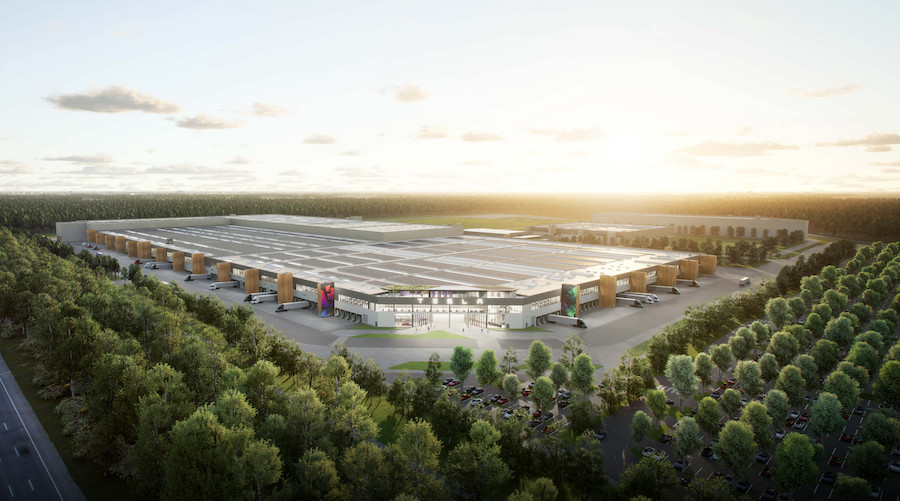
Computer rendition of the Berlin-Brandenburg gigafactory, Tesla’s first manufacturing plant in Europe. (Image courtesy of Tesla.)
US electric vehicle (EV) maker Tesla received on Friday conditional final approval for its $5.5 billion German gigafactory outside Berlin, which is expected to boost the carmaker’s market share in Europe’s fast-growing EV sector.
“This is a new chapter in our industrial development,” Brandenburg State Premier Dietmar Woidke told reporters in Potsdam. “We need big projects like Tesla.”
The approval means that Tesla can start operations within days, though, in a way — it already has. In late February, Tesla workers elected their first works council, a group of employees that in German law co-decide employment aspects, such as working hours, leave and training.
“For Elon Musk, Tesla’s anti-union chief executive, this must rankle. He has tried to shield his first German plant from Germany’s strict labour laws by incorporating the business as a Societas Europaea (se), a public company registered under European Union corporate law that is exempt from some “co-determination” rules,” Cynthia Moles wrote for The Economist.
While the move exempts Tesla from the requirement of having more than 2,000 employees to give workers half the seats on supervisory boards, it does not free it from having a business council.
German politicians have backed the factory in the small town of Gruenheide because it promises thousands of jobs in a region that has little heavy industry. So far, Tesla has hired about 2,600 of as many as 12,000 workers for the site.
The local industry, including Volkswagen, has argued the opposite. The German vehicle makers fears the factory could cost hundreds their jobs. To mitigate the potential effect, VW plans to launch 70 EVs and opes six battery gigafactories in Europe before the end of the decade.
It has also vowed to spend €35 billion ($41.7 billion) by 2025 in EV technology and further downstream, such charging infrastructure and recycling of spent batteries.
Tesla’s gigafactory is designed to eventually make batteries and as many as 500,000 cars a year. The company will start with between 5,000 and 10,000 vehicles a week by the end of this year.
The announcement on Friday came as a judge in Frankfurt was considering a lawsuit challenging the plant’s opening over water issues. Local officials have maintained that the lawsuit, filed by environmental activists, would not derail the plant’s opening.
Objections against the conditional permit can be filed over the next month.
Shortages
Both VW and Tesla may see plans thwarted by an expected shortage of battery metals, namely nickel and lithium.
Musk has expressed worries about a nickel supply. He pleaded with miners last year to produce more nickel, promising a “giant contract” for supply produced efficiently and in an “environmentally sensitive way.”
The EV giant inked in October a multi-year nickel supply deal with New Caledonia’s Prony Resources. The contract guarantees it about 42,000 tonnes of the metal needed to produce the batteries that power its EVs.
Tesla also has a similar agreement with BHP and, most recently, with South Korea’s LG Chem and Australia’s Liontown Resources (ASX: LTR),
VW is said to be in talks with suppliers to secure direct access to raw materials.
No comments:
Post a Comment